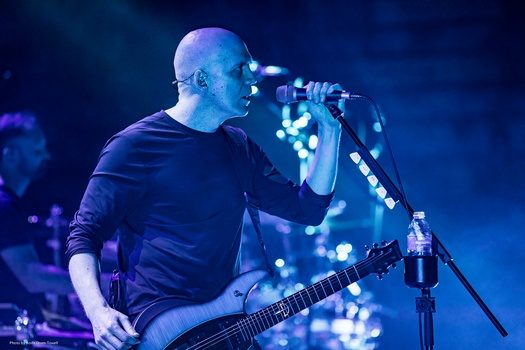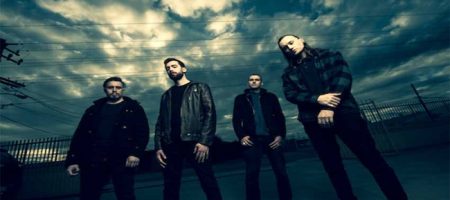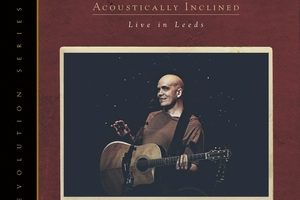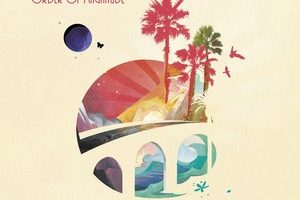Devin Townsend – Following Compulsions
Sunday, 1st July 2018
One of the select few in heavy metal culture that truly needs no introduction, Devin Townsend has had a long, storied history with the genre. Most recently, his journey has involved a group of musicians in the Devin Townsend Project, which ran for the last decade with a slew of creatively interesting and different albums. In fact, the now released Ocean Machine: Live at the Ancient Roman Theatre Plovdiv now marks the end of said era, and the beginning of something new.
An excellent note to go out on, the live release contains a fan-chosen setlist as well as the entirety of Ocean Machine live (with an orchestra no less). But that is now the past, so after a quick chat with Townsend about said release and Ocean Machine, it seemed high time to inquire about what lies in his future. What follows is an honest and thorough chat about his creative process, getting rid of the DTP, and some financial constraints, as well as some intriguing looks ahead.
Dead Rhetoric: Do you see the Ocean Machine live release as fitting way to shut the door for Devin Townsend Project for the time being?
Devin Townsend: Yeah, as good as any I would say. The whole past decade of relentless activity with DTP was such that by the time we got to that show, I was on autopilot in a way…emotionally at least. In hindsight, to be able to look at it, I think it’s a great thing that we had the opportunity to do. So yeah, I do think it’s a good, fitting ending.
Dead Rhetoric: Looking back on it, what did Ocean Machine mean to you at the time you first released it?
Townsend: I didn’t really know I think. It’s another example of hindsight being 20/20, right? While I was making Ocean Machine, it was fraught with the same sort of creative, existential dilemmas that I still face today. Here I am working on Empath and Moth, and I’m talking to people that are close to me and saying, “I’m thinking this…I don’t know about this…I’m confused by that….” And the people who are close to me are going, “Dev, you do this every fucking time man.”
It’s funny when I get told that, because when I think back to Ocean Machine, it was the exact, same process at the time. ‘I didn’t know if it was going to fit in. I didn’t know if that kick drum sound would work. “The Death of Music” maybe shouldn’t be on it.’ So when I think back to it, it’s exactly the same thing I’m doing now, but with a different set of influences and different age things.
Dead Rhetoric: You always have had that anxiety when it comes time to releasing new material it seems – almost like an insecurity. What role does that play in your music, as you were saying, since you’ve had these sort of issues throughout your career?
Townsend: There’s a real practical answer to that – the way that I discover what a record is about is by flailing through ideas. As much as by the end of it, the record is very defined – be it Ki, Terria, Ocean Machine, or Synchestra – the process of defining that is completely me in the dark. Until I fumble across lyrics, riffs, songs, or ideas/colors/fonts that resonate with some sort of internal sense of where I’m at, at that particular point in my life. So is that rooted in insecurity? Absolutely man, holy crap! I’ve got no ability, and it’s doubtful I ever will, to view myself objectively. To be able to stand back and say, “Dev, you are clearly here.”
It’s much more that I get the impulse to make a record because I have this feeling. This intangible color, I guess is the best way to describe it, that becomes more clear the more I uncover. It’s very akin to, and I guess a good analogy for it, would be that you are feeling around in a dark room and you are bumping into things. You have to end up shining a light on that and being like, “Oh, it’s this! So how does that relate to this other thought that I had that struck a chord? Why, amidst this period, does the color orange seem appealing to me? Why, of all these things that are in my creative mindset, does the concept of ‘X’ continuously come up?”
It’s like an archeological dig, and I should be able to get over the anxiety, because I prove to myself every time that I’m going to find it. It’s not like ego, or my whatever, is going to allow me to put out something that’s inaccurate. So in that sense, I guess the stress is optional. Who know, perhaps that stress as well, is a good motivator. I don’t claim to be particularly clever with it, I just claim to be able to get it done.
Dead Rhetoric: What do you think would happen if you were to just walk into something…and to continue with your analogy, if you were to walk into a room with the lights on? What do you suppose would happen?
Townsend: Well, I would already know what it was. There’d be no reason to do it. It’s like, my creative process is not rooted in a need for exploration but it’s very much that my work is a convenient loophole for me to be able to grow as a person. Just by the process of uncovering, let’s take Ki for example. Those colors, that aesthetic, that tone, that echo, the reason that song flows into the next song the way that it does – it’s only in hindsight and was able to listen to it and say, “Oh, you were there.”
If we are making this simple, for the sake of definitions – you were depressed. You were angry. You were in love. Whatever the topic was, I think I’m just emotionally, so stunted, that I require that process just to be able to move, personally, from one phase of life to the next.
Dead Rhetoric: Your musical journey, per say, has changed and evolved as you have gotten older. How do you see that trip from your point of view?
Townsend: One thing I’ll say is that I don’t put a lot of significance on it. As much as I bang my head against the wall, and I’m fortunate enough to be asked about it in interviews, I can imagine that it comes across that I think what I do is hugely significant, based simply on the amount of effort I put into it. I think that it’s fair to say that I don’t actually consider what I do to be as significant as it may come across. But it’s a compulsion. I’ve spent a lot of time – you go through these existential moments of “Why do you do this? What level in your psyche is the fact that you invest so much energy into this? Is it unhealthy? Is it narcissism? Is it just fear? Is it just whatever?”
But ultimately, what I have come to the conclusion of is that this is just what I do. It’s neither here nor there. It’s just what I do. I like to think that I have made peace with that, and the unfortunate part for the people around me, is that it’s not clear until I’m deeply invested in it as to which direction to go in. I usually just know what it’s not [laughs]. It’s a process of elimination. I’ll go, “It could be this!” Then I’ll do it and go, “Nope!” Then unfortunately you leave people in your wake, and you have to make peace with that too.
Dead Rhetoric: You’ve mentioned Empath and Moth, and you have more things on the books as well. When you are juggling material for multiple albums at once, how do you maintain focus and say, “I’m going to work on this one next?”
Townsend: You follow your compulsions. That’s why it’s sometimes frustrating. Your compulsions lead you to places that need to come out. If I try to work on a piece of music or theme that I’m not interested in, whether or not there’s money involved with it or anything, if I am working on something that is contrary to what my internal needs are, I hate it.
How I write is when I wake up, I say, “How do I feel today?” Opposed to saying, “I’m going to continue working on that song I’ve been working on.” Unless I’m driven towards that, it’s going to be a waste of my time. So instead, I just write in the path of least resistance. You just follow the thing that wants to go. As romantic as that is, I have to be practical. I’ve got a career, I’ve got a business, I’ve got a label, I’ve got all these things that rely on me having some sort of level of consistency between these things.
For example, with Empath, the identity of it is just starting to emerge. But I don’t have much time left. So it’s frustrating for me because I’ve spent months trying to capture that hue that’s in my mind, sonically. Dude, I’ve been writing streams of uber-complicated, bizarre music. It’s not because I’m thinking, “Isn’t this great? This is exactly what I want people to hear.” I’m just following it. There’s a part of me that gets really frustrated with it. It would be really nice if we could just get through this shit, and get to the point where I can make some real songs. In a sense, I’m a slave to it, but in a way that’s not nearly as dramatic as that may sound.
Dead Rehtoric: Cutting out the rest of the DTP and focusing in on your own, does that give you some leeway in terms of allowing you to mull things over?
Townsend: It’s huge. With absolutely no disrespect to those guys, but I find that because my creative process is so internalized, the sheer fact that I have to explain myself to people is fucking exhausting. Because the way that it manifests is confusing to a lot of people. I can express it and articulate it to you because I’ve got coffee in me and I know I’m accountable for these interviews so I have to be careful with what I say – that makes sense to me. But in social situations, to come in and say, “I don’t want to do it because I don’t want to do it.” You are just going to confuse people that you care about.
The fact that not only do I not have to rationalize anything I have to do, or I choose to do, but also in the background, there’s not this internal sense of ‘get your shit together because each month that goes by is costing you $15,000.’ It’s that lack of pressure for me, I think in talking to you, it explains why I vomited out all this chaotic music for the first couple of months in this process. There’s so much anxiety that was being held by having to play ball with people. Again, it resulted in some cool records – Transcendence I let them [the band] be involved a little more than in the past. But I just didn’t enjoy it, ultimately, because the process that I employ is not one that I feel can be compartmentalized.
Like I said a minute ago, If I am forced to do something that is in opposition to what my creative impulses are telling me, and that could be anything. It could be ‘write with these guys’ or ‘you need to have a commercial song on this record’ or ‘this needs to be heavier.’ No matter what I’m being told to do, it fucks up my flow. My hope is that now that DTP is done, or on hiatus or whatever it ends up being, I hope that I can learn from my past. My desire to be in ‘a gang’ or a band – I hope that I can learn from this, that as much as I like a band, it just keeps causing problems for me.
Dead Rhetoric: You touched upon the whole ‘money thing,’ and I know that it’s something you’ve been mentioning with Moth for a while. What are some of the realities of budgeting something like that, which people may take for granted?
Townsend: That’s a difficult question, because the last thing I want to do is to be perceived as being ungrateful for what I do. Every day I’m grateful for what I do. The fact that I have people, professionally and on an audience level, supporting things so passionately…never for a moment would I consider making money something that I’m bitching about at this point. I’m down with Spotify, I’m down with whatever. I just want to fucking do it. I’m not looking to make $10 million. I’ve got more than I need. I’m great.
However, the industry has totally changed over the last 20 years, to the point where in order for somebody to put someone on salary making music that is fundamentally rooted in being uncompromised…the reality of that is in opposition to having healthy family relationships, healthy artistic relationships, because you have to keep the machine going. For someone of my stature, I get a lot of attention but I don’t sell a lot of records right? Some of the shows that I do make a good chunk of money, but that tends to have to pay for the ones in different territories that you make shit. So the reality of it is that the complications of paying for insurance, visas, band members, per diems, gear, all this shit, turns what I do creatively into something I resent, because I’m not free to be like, “You know what, I don’t feel like doing shit this month except for getting my house together, making sure the family is together” and writing where I’m at as opposed to what I think the audience will buy, because I have to fund this fucking thing.
It’s a dual-edged sword, because on one level, by having an organization of people on salary and that sort of thing, you get a level of familiarity and consistency with it and that’s a benefit. But in light of everything I’ve discussed with you up to this point about how my creative process works, and hopefully I’ve been able to articulate it in a way that makes at least a little sense, it’s in direct opposition to it. So for me, by not having people on salary, having my own recording space, by keeping my overhead low, I can take more time. By taking more time, I can do the thing that has gotten me a career in the first place. If I get rushed, if I get into that treadmill, which I was getting into, I just totally lose the plot. I end up writing, very literally, from the point of view of, “Gosh, I hope people like this, as opposed to, I fucking really like this and this is really what I need to say.” So money is a weird thing for that.
Also, when there are people that you care about, like in a band, become dependent on you to do that, you can’t just say, “Guys, I need a couple of months to process this.” At that point, it’s like, okay but everyone still needs to get paid. So in those months, you aren’t actually processing anything, you are just kind of running. By proactively having to be a little more selfish and saying, “I don’t want to have to do that anymore” because the thing that is the most important to me, and ultimately to the music itself, is for me to be free to explore each phase of my life, with the musicians that I choose to, with the styles that seem most compelling…I still have to think about money, but without dependents, it makes it a lot easier to make decisions that are not rooted in finance.
Dead Rhetoric: To finish up with one quick one, I know there’s Empath and Moth on the horizon, but what’s coming up in the next six months or so?
Townsend: I’ve got to have the record delivered by November. I look at starting to present myself live again, probably January or February of next year. The ways that I am going to present myself live are yet to be determined, but all signs point to it being varied forms of performance…as opposed to, ‘here’s just a new band with a bunch of different guys, doing the same thing I’ve been doing.’ I like more the idea of each thing that I do being different. Like maybe this one tour that I do is with a select group of musicians, and the next tour is a one-man band. The next thing is me with an orchestra…the next is Casualties or Ghost.
By doing that, and not having people on salary, it will allow me to, in the same way that I follow the music on an album to album basis, it will allow me to do the same thing in terms of performance. I can say, “What feels best to do right now?” My hope is that I can sort of take the upswing of attention that I have gotten, based on the work that I and the DTP have done, and turn it into things that are really interesting for people live. There’s a good chance of it not being a ‘band’ band, but as long as the music gets represented accurately, I’m cool with it.
Dead Rhetoric: That’s really cool – I’m intrigued at the way things could go.
Townsend: Me too. I’m not taking it lightly either. People say, “Oh man, you get some time off!” But my time off is best spent…my wife was like, “You need a hobby.” I said, “I love my job.” My job is what my hobby is as well. The breaks that I allow myself now are when I feel that I’m going off the deep ends with over analysis or whatever, I am able to step away from it for a couple of days. But even that is a luxury in the long-term and it doesn’t matter because I enjoy it.




























